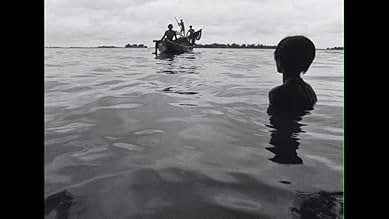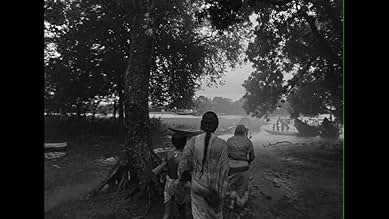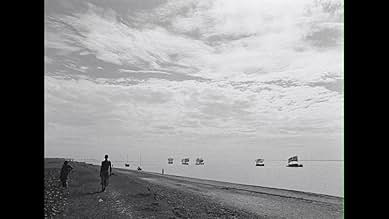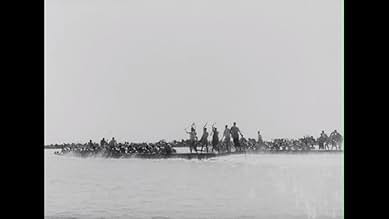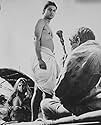Einer der Fischer, der am Ufer des Titas-Flusses wohnt, heiratet ein Mädchen aus einem anderen Dorf, das er nach dem Tod ihres Mannes vor Opferung gerettet hat, nur um sie den Piraten zu übe... Alles lesenEiner der Fischer, der am Ufer des Titas-Flusses wohnt, heiratet ein Mädchen aus einem anderen Dorf, das er nach dem Tod ihres Mannes vor Opferung gerettet hat, nur um sie den Piraten zu übergeben.Einer der Fischer, der am Ufer des Titas-Flusses wohnt, heiratet ein Mädchen aus einem anderen Dorf, das er nach dem Tod ihres Mannes vor Opferung gerettet hat, nur um sie den Piraten zu übergeben.
- Regie
- Drehbuch
- Hauptbesetzung
Empfohlene Bewertungen
I tried to remember pieces of seeming senseless conversation parts. I could for one: "I knew a man who could recite the whole Mahabharata ..." Would you embrace and be impressed by a Western film wherein you hear someone stating: "I know a man who knows the whole Bible by heart"?
These may be cultural relativity. But filmmaking should not be dependent so much on it, especially its technical aspects. I have hardly ever seen a worse photography, a worse soundtrack. When the scenery consists of a talking group of people, we see them occupying the lower third of the frame, the lower limb cut off. About half of the frame is filled by the sky! No sort of surrealism or experimentation or exxageration.
The sound in the mostly open air, natural village background sounds shouting like if recorded in a narrow hall.
You'd think that after a lifetime of reading fantasy and studying the anthropology of magic, this would be catnip to me. However, fantasy as it is written tends to have an almost engineering quality to its construction, with things like quests that must be undertaken, or great monsters that must be fought, or princesses that must be rescued. The patterns are too familiar. Likewise, the magic in these things is constructed like machinery. Occasionally you run across things based on Greek mythology, where the gods are squabbling people taking one side or the other, and throwing thunderbolts or sending earthquakes.
But to look at this movie is to see a society that is barely above animism, the belief that everything has a soul, whether it is a human or a cat, or a tree, or a rock. And the only way someone like me can handle a worldview like that is in a mechanical fashion. There is no mystery, just ignorance, and a rock falls from your hand to the ground when you release it regardless. But the characters in this movie believe in the mystery. The river Titas may just go away, or Miss Samad may just be fooling herself. No one knows anything, and no one can know anything. It's not a worldview I can believe, and so I am reduced to seeing if the movie is internally consistent.... but that won't work either, because if it's not, then that is also a mystery, an insoluble one that is a fact of existence.
It makes my head spin. Ritwik Ghatak's movie tells a tale of a small fishing village where reality and legend are the same thing. Is it a good telling? My Western mind can't really tell.
This film is an adaptation of Adwita Malla Burman's Bengali literary classic under the same title. It is tale of those marginal people belonging to a poorer fishing community who live from hand to mouth. Exploring different sectors of life is one of the most amazing aspects of both the film and the novel.
The film sequences are maintained in parallel to the novel. The film has brilliant editing and that makes it very dynamic and fluent. Fade-ins and fade-outs for transition are used in many cases. The film seems to be gradually acquiring technical sophistry. Fixed frame is used in many cases and the camera movement is kept at a minimal level at the beginning of the film. Panning, tilt-ups and tilt-downs are countable. But this 'apparently' mediocre camera usage could not amputate Ghatak's craftsmanship. Some continuity cuts during the long duration shot of 'Dourer Naw' (Boat for Running Races) certainly deserve positive appraisal. The film has some stunning close ups. They really deserve applause. The close ups are symbolic and very well-articulated.
Negative aspects are minimum but they cannot be overlooked as they have an effect on the film. Sometimes the characters deliver speeches in a word or two in urban Bengali which betray the realism their acting. The film has got only two framing errors. It is the disadvantage of using fixed frame. Moreover the spectators are captured who came to watch the shooting for once (while Basanti was engaged in a fight with her mother) in the film. In another case, probably the prompter is captured or the person may be another spectator while Kader Mian was arguing with his daughter-in-law. The sequences sometimes seem to be incredulously positioned. Moreover, they seem to be hastily pushed towards their respective ends. But Ritwik's crave for stark realism is praiseworthy. Other than these, this film is technically perfect.
The film is a must watch for having a better exposure of the lives of marginal people of a third world country. Technical excellence is another reason to watch this film.
Taken at face value, this film comes across as a long melodrama, and a pretty damn contrived one at that. A couple of young men go out fishing with their uncle, and in a chance encounter with a young woman in another village, one of them gets married. It's pretty odd, as they don't know each other's names, barely speak, and yet consummate what amounts to an agreement for an actual ceremony back in his village. On their way back home, however, they're set upon by bandits and she ends up overboard.
It's interesting (and a little depressing) to see how women are treated early on here - when they discover the woman gone, the reaction of the men is to shot they've been robbed, as if she's a material possession. Meanwhile, back at home the groom had a young girl waiting for him - and I do mean young; she's told by her uncle that she's a "woman now" but looks about 10. However, there is a strong woman character who emerges later in the film, one who stands up for herself and amidst great hardship says that there is only one true thing in life, and that's motherhood.
Back to the story. The man goes crazy literally that night for fear his wife has drowned - even though he was just telling his buddy he didn't even know what she looked like, and certainly hasn't formed deep feelings for her. And it turns out the woman survives and is picked up by benevolent strangers, but the next we see of her we've fast forwarded ten years. The only thing she knew about her husband was the name of his village, and she has a child, having conceived on her "wedding night." She makes her way to this village (why only now, we don't know), and throws herself on the mercy of the villagers. The woman who takes her in is the one who had loved her husband. She got married to his buddy instead, but the buddy died, so she's a young, childless widow herself.
Now how the villagers aren't able to connect the dots and realize that this new arrival and the "crazy man" living among them were the ones who had married years ago is a mystery, and it's also odd that the woman doesn't recognize the man, even though he's all disheveled and years have passed. She's attracted to him nonetheless but tragedy strikes in a way I won't describe, leaving their son an orphan. He's cared for by the same family that took them in, but the woman's mother looks at him as her mortal enemy since he's not kin and consumes food. He has visions of his dead mother as a goddess, but his real life is very sad. The plot follows the boy and his adoptive mother (or "auntie") from there and continues its quick pace for dramatic turns of events in the second half (yes all of what I described happens in the just the first half).
While the plot is sprawling and a bit of a mess, the film is undoubtedly a parable for something higher. At its heart it seemed to be about loss, forms of which happen to many characters through fate, or man's cruelty to man. Just as the rain pours down on this river (it's a very wet film!), life pours down on people, if I can use such a cliché analogy. In our better natures, we help others and are compassionate, and in our worse natures, we're selfish and unkind. The film is about life and carrying on despite the struggle, even though ultimately everything we cherish will eventually pass away - even big things that seem so permanent, like rivers. That's alluded to in the first ten minutes with the quote at the top of this review, and there's something deep at the film's center that I appreciated. I only wish it worked as well on a literal level.
The caliber of filmmaking is high, with beautiful black and white cinematography that transported me to this time and place. Attention is paid to sound, such as the heavy breathing of anxiety from the young woman before being taken to bed by her husband on their wedding night. The performance from Rosy Afsari stands out in a pretty solid cast. All of the ingredients are there, and with the deeper meaning it was a near miss for a higher rating.
Wusstest du schon
- WissenswertesDirector Ghatak appears in the film as a boatman, and Basanti's story is the first of several melodramatic tales.
- Zitate
Ramprasad: That's the way it happens. It all comes and then disappears again. There's a spark of life. And suddenly it's not there. It all becomes untraceable. You were a child yesterday. Today, you're a woman. This ever-flowing river Titas may become bone dry tomorrow. It may not even have the last drop without which our soul cannot depart. Yet these flocks of sails move on and on and on...
Top-Auswahl
Details
- Erscheinungsdatum
- Herkunftsland
- Offizieller Standort
- Sprache
- Auch bekannt als
- A River Called Titas
- Produktionsfirma
- Weitere beteiligte Unternehmen bei IMDbPro anzeigen
- Laufzeit2 Stunden 39 Minuten
- Farbe
- Sound-Mix
- Seitenverhältnis
- 1.37 : 1
Zu dieser Seite beitragen


